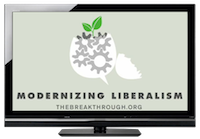“Party Crasher” Rich Tafel: What AIDS Activism Taught Me About Social Change

What’s the Big Idea?
Long-time political activist and self-proclaimed “party crasher”Richard Tafel believes that American democracy is under threat. The environmental, economic, healthcare, and political systems we’ve relied on for decades are breaking down, he says.
But unlike most radicals, Tafel’s critiques of government are animated by a conviction that it’s more effective to promote social change by reforming institutions from within, rather than pounding one’s fists helplessly against the gates of power.
It’s a lesson he learned from experience more than from theory. As a young organizer in the 1980’s, “working as an Aids buddy… you volunteered, they died after two months; you volunteered, they died after two months. You very quickly said ‘Wow, we can do a better job of burying people — or we’re going to have to get involved with systems change.”
Watching close friends become casualties in the HIV/AIDS epidemic convinced Tafel that only a strong, well-connected movement with an agenda and informed positions on policy issues could succeed in transforming any given situation.
The problem with local movements, he noticed, is that they’re built around personalities and loose friendships, so they last only as long as the individuals who comprise them. It’s a problem that grassroots organizations have struggled without history: how can you challenge authority while maintaining your own unified voice? What is the role of hierarchy in social change? Can political “insiders” be allies?
They can and they must, says Tafel. The Gay Civil Rights movement was one of the great successes of the past decade precisely because of their ability to change tactics and go mainstream. “We had to learn about public policy, government policy under rugs, discrimination laws,” he explains. “We had to learn how to engage the system. Now I see that that particular epidemic was so dramatic that it almost drove us to that conclusion.”
In 1995, Tafel went directly to the heart of the matter, founding the Log Cabin Republicansto promote equality for gay and lesbian Americans — with a full-time staff in DC and a political action committee. At the time, he fell neatly under the umbrella of “social liberal, fiscal conservative.” Since then, his thinking — both political and strategic — has evolved further.
As the Republican party has tipped further to the right, he finds himself questioning some of the fundamental principles driving the conservative agenda. Too many people are being left behind by free market capitalism, he says. We’re at a point where we need to be rethinking the structures around which nations — and the global economy — are organized: “Capitalism is going to have to recreated itself in a more impassioned way.”
What’s the Significance?
Today, he directs The Public Squared, which does political advocacy work to “multiply the impact of citizens seeking to build a more just society.” The focus of his work has shifted from a domestic to a global focus, but he remains committed to confronting problems by looking at the big picture rather than fighting symptoms one by one.
“Much of the work that I do with social entrepreneurs… feels a lot like the Titanic is sinking and they’re bragging about what beautiful, clever lifeboats they’re putting off the side for a small group of kids who get rescued from this school, from this broken healthcare system, in this lucky place,” says Tafel. “The reality is a lot of people are going down.”
Getting a picture taken with a handful of children may make us feel good, but it should never be mistaken for social justice work. “I think a lot of what we say is social change and non-profit is allaying fear. We’re pretending like we’re doing something, but we’re not dealing with systems.” How can we change the way we make change?
Click to read Rich Tafel’s Five Ways to Change the System from Within.
Image courtesy of Shutterstock.





